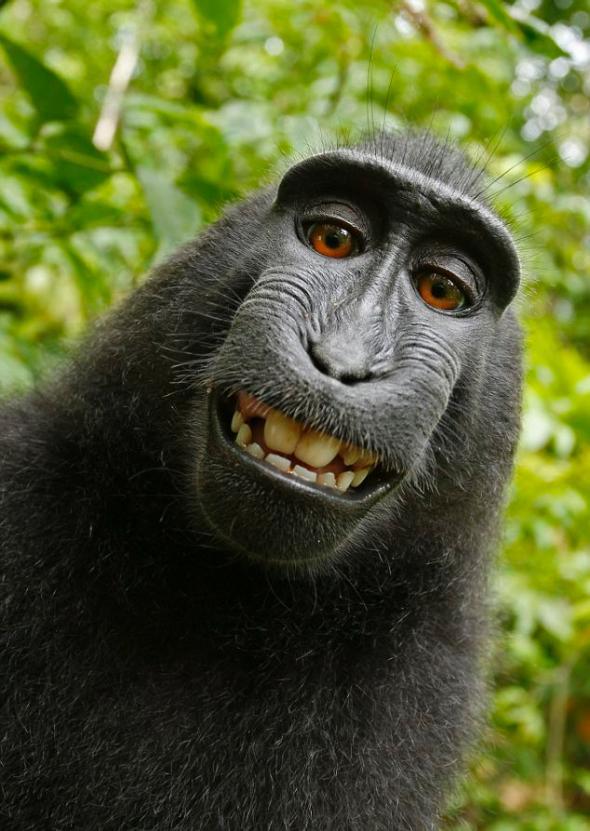You have to feel for David Slater. In 2011, the British photographer traveled to Indonesia to take pictures of the crested black macaque, a snouty primate with reddish, somewhat possessed-looking eyes. During the expedition, fortune struck when, in the words of the Telegraph, “one of the animals came up to investigate his equipment, hijacked a camera and took hundreds of selfies.”
Miraculously, at least one of the shots (above) turned out absolutely superb. Just look at those peepers.
Now, Slater is in a fight with the Wikimedia Foundation, which has posted his photo online in its collection of public domain images and refuses to take it down. It argues that Slater doesn’t own the picture’s copyright, because he didn’t take the picture—the monkey did. And since the monkey can’t own the rights, nobody does.
“That trip cost me about £2,000 for that monkey shot. Not to mention the £5,000 of equipment I carried, the insurance, the computer stuff I used to process the images. Photography is an expensive profession that’s being encroached upon. They’re taking our livelihoods away,” he told the Telegraph. “For every 10,000 images I take, one makes money that keeps me going. And that was one of those images. It was like a year of work, really.”
As many of us learned thanks to Ellen DeGeneres’s Oscars selfie, the copyright on a photograph usually goes to the person who actually hits the shutter. But in this case, there was no person. There was instead a curious monkey—one who wouldn’t have had the opportunity to shoot a picture had it not been for Slater’s efforts. Surely there must be a way for him to assert the rights to the work?
But no. According to copyright professors, Wikimedia is right: The photo is almost certainly in the public domain.
“It’s a great final-exam question for a copyright class,” says June Besek, executive director of the Kernochan Center for Law, Media, and the Arts at Columbia Law School. “Under the copyright law as it’s been interpreted, there has to be human authorship for there to be copyright. So I would say there isn’t copyright on the photo.”
But didn’t Slater play an important role in the photo’s production, by providing the camera to the monkey?
Not really, Besek says. Authorship of a photo usually involves choosing the perfect angle, moment, and light. “If the situation were different—so the photographer set up a jungle photo, and the photographer stepped out for a smoke, and the monkey ran up and pressed the button, then I would say yes, there is human authorship,” Besek says. A macaque grabbing your Nikon isn’t good enough.
“The photographer doesn’t own it. And the monkey doesn’t, either. It’s in the public domain,” says Chris Sprigman, a law professor at New York University. “To copyright a work, an author needs to show they produced it through their own creativity. It doesn’t matter if you traveled thousands of miles to capture a photo if you weren’t involved in actually snapping it.
“The fact is, copyright’s not there to reward people for their labor—it’s to incentivize people to create new books or poems,” Sprigman adds. “Did this guy need an incentive to produce monkey selfies? No. He needed an incentive to go to Indonesia to take photographs. And by accident, he ended up with monkey selfies. The monkeys didn’t need incentives, either. They just did it for the pure pleasure of hearing the shutter click.”
What if you were an artist who was curious about what would happen if you left a camera with a bunch of monkeys—could you copyright the resulting work? “This is a question about how copyright handles conceptual art,” Sprigman says. “I would say that aesthetic theory is pretty deep. And copyright’s aesthetic theory is pretty shallow.”
In any case, Slater wasn’t a conceptual artist—he was a nature photographer whose camera got stolen. That said, he might have an out if he made “substantial” edits to the photo in post-production by, say, adjusting the color to make those peepers peep even more, or by cropping it to improve the perspective. Of course, it’s hard to say exactly which kinds of edits the courts would consider substantial.
“Copyright is so bizarre,” Sprigman says. That, I’m sure, even David Slater would agree on.
